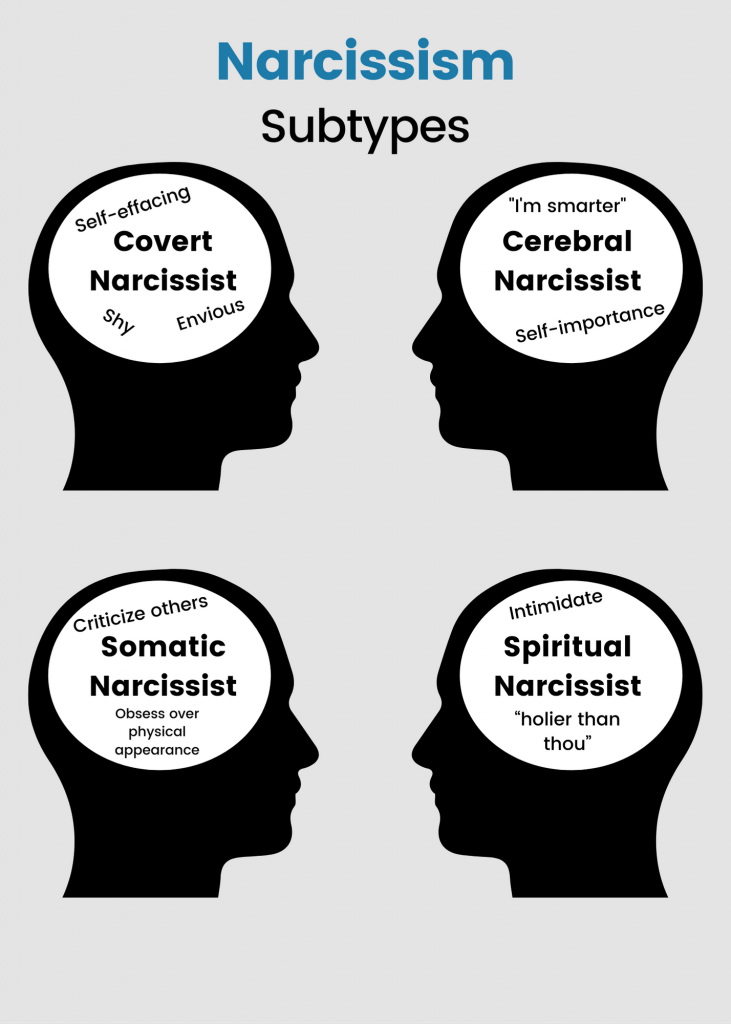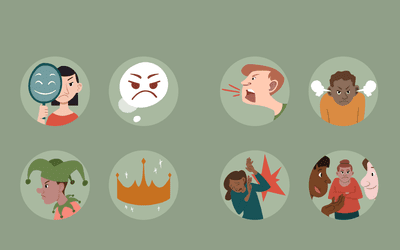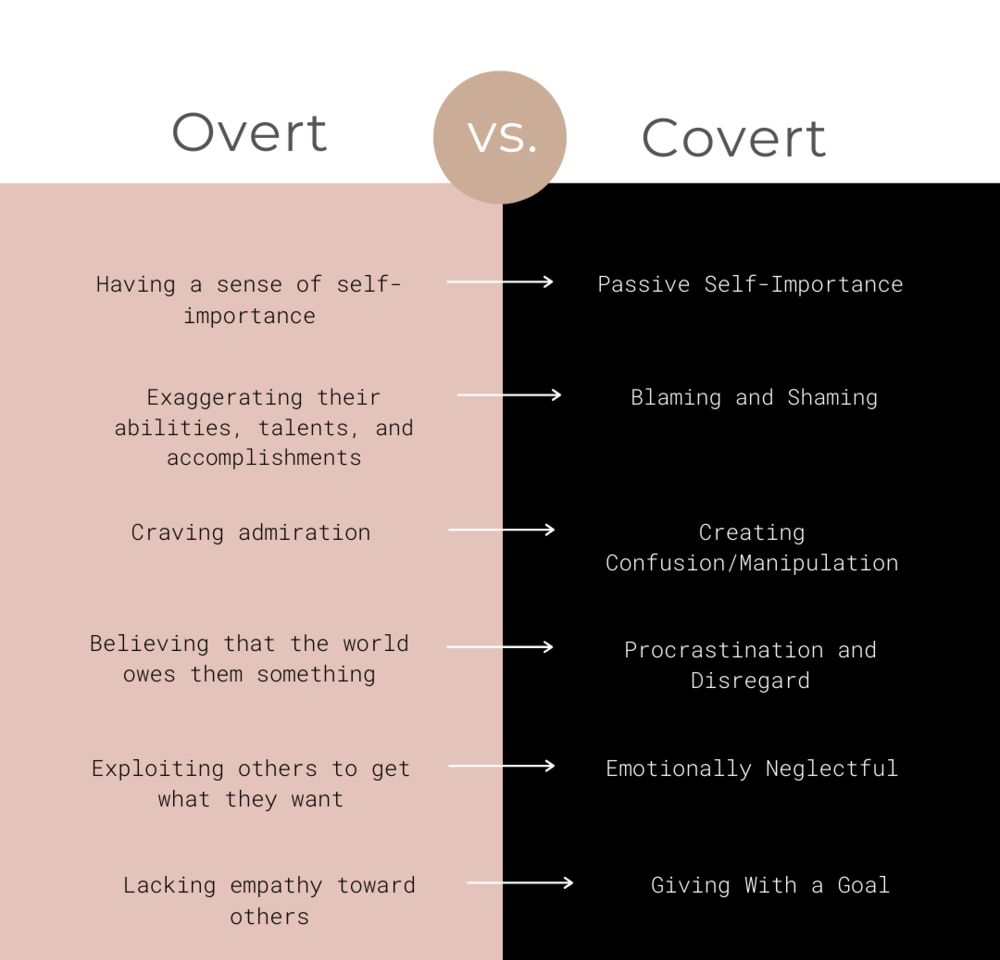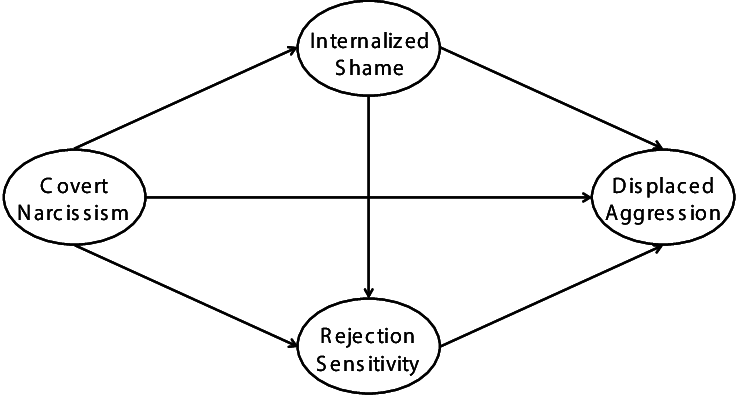Do you know someone who is excessively modest or shy and yet seems to crave attention? They may be a covert narcissist. Covert narcissists are difficult to spot because they often do not fit the stereotype of the typical narcissistic person. They are not always loud and arrogant; in fact, they may be quite introverted and seem very self-effacing. So, what are the signs that someone is a covert narcissist? And how can you deal with this type of personality disorder? Read on for covert narcissist traits and more.
Contents
Understanding Covert Narcissism

Covert narcissism is a type of narcissism that is less visible than the more common overt narcissism. It is a personality disorder that can be hard to spot because people with this condition often hide their true selves from others. They may act shy and withdrawn in public, but have no problem being the center of attention when they’re alone or with close friends family members who know them well enough not to judge them.
Covert narcissists often feel like they’re not good enough, but deep down inside they know that’s false. So they’ll do whatever it takes to prove those negative thoughts wrong by acting out against others in an attempt at getting attention and validation from them. They may also struggle with depression because of how much time has been spent trying to impress others instead of focusing on their own needs first.
NOTE: People who are diagnosed with covert narcissism often have an excessive need for approval and validation. But they do not typically display the typical signs of narcissism such as arrogance and entitlement.
History And Development
The term covert narcissism was first coined in 1988. It is a subcategory of the more commonly known “overt” type of narcissism. The two types are very similar and as such, it can be difficult to identify which one you have or if you have both types simultaneously.
Traits of Covert Narcissist

Some of the traits that are commonly associated with covert narcissism:
Self-effacing And Shy But Crave Attention: A person with covert narcissism is likely to be self-effacing, shy, and modest. They are often very sensitive and can easily become overwhelmed by their emotions.
Inflated Sense Of Self-Importance: Covert narcissists often have an inflated sense of self-importance. They believe that they are special and unique and that they deserve to be treated differently than other people.
Need For Admiration: Covert narcissists have a strong need for admiration. They feel that they are not given the recognition they deserve and sometimes seek out praise even when it is not warranted.
Strong Need For Control And Domination: Covert narcissists often have a strong need for control and domination. They may be ambitious, but they also want to make sure that they are in charge.
Difficult To Accept Negative Feedback: People who are diagnosed with covert narcissism often find it difficult to accept negative feedback. While overt narcissists may respond with anger or rage when criticized, covert narcissists often feel hurt and humiliated.
Masked Low Self-esteem And Insecurity: They often have low self-esteem and may feel insecure about themselves. But they also want everyone else to think that they are not as vulnerable as they appear. And they are afraid to be alone, so they will do anything to keep people around them.
Risk Factors of Covert Narcissism
The exact cause of covert narcissism (covert narcissist traits) is unknown. However, there are some risk factors for this type of personality disorder:
Having a parent who is a narcissist: There is a strong correlation between having a narcissistic parent and developing covert narcissism.
Experiencing childhood trauma or abuse: Covert narcissism may develop as a result of childhood trauma or abuse.
Having parents who are overprotective or neglectful: Having overprotective or neglectful parents may also lead to the development of this type of personality disorder.
Excessive criticism or overindulgence: If you were raised in an environment where there was excessive criticism or overindulgence, it may increase your risk of developing covert narcissism.
Being an only child: Some experts believe that children who have siblings tend to be more confident than those who are only children. And this may lead to the development of covert narcissism.
Overt Narcissist Vs. Covert Narcissist

It can be difficult to tell the difference between a covert narcissist and an overt narcissist. But there are some key differences:
Flashiness Vs. Subtlety
- Overt narcissists are often very flashy and attention-seeking. They want everyone to know how special they are and will go out of their way to make sure that they are the center of attention.
- Covert narcissists, on the other hand, are much more subtle. They often try to fly under the radar and do not want anyone to know how they feel.
Arrogance Vs. Humbleness
- Overt narcissists are typically very arrogant and entitled. They believe that they deserve special treatment and are not afraid to let others know it.
- Covert narcissists are usually much more humble and may even seem shy or insecure. But they often have a hidden agenda and will do whatever it takes to get what they want.
Vulnerability To Criticism Vs. Difficulty Accepting Negative Feedback
- Overt narcissists are less likely to be affected by criticism than covert narcissists. They may react with anger or rage.
- While covert narcissists often feel hurt and humiliated. As they are more likely to have low self-esteem and be insecure about themselves.
Excessive Attention-Seeking Behavior Vs. Manipulative Behavior
- Overt narcissists, on the other hand, often have no shame when it comes to seeking attention. They may engage in excessive attention-seeking behavior, such as making outrageous statements or dressing provocatively.
- Covert narcissists are often very good at hiding their true motives. They may act like they are not interested in attention or admiration, but they are very needy and will do whatever it takes to get it.
Need For Admiration Vs. Need For Control
- Overt narcissists have a strong need for control and domination
- While covert narcissists have a strong need for admiration
Dangers of Covert Narcissism

While overt narcissism can be dangerous, it is generally less harmful than covert narcissism. Covert narcissists are more likely to engage in manipulative and destructive behavior, such as bullying, gossiping, and social exclusion. They also have a higher rate of mental health problems, such as depression and anxiety.
Covert Narcissism And Mental Health
Those who have covert narcissism (covert narcissist traits) are more likely to develop mental health problems, such as:
Depression: Covert narcissists may feel depressed because they do not get the attention and admiration that they crave. They also feel inferior to other people and believe that everyone is better than them. This can lead to low self-esteem and feelings of worthlessness.
Anxiety: Covert narcissists often feel anxious and tense because they are always worried about what other people think of them. They also fear that they will be exposed as a fraud or that someone will find out their true identity. This can lead to panic attacks and excessive worrying.
BPD: Borderline personality disorder is a mental health condition that causes people to have unstable and intense emotions. Covert narcissists are more likely to develop BPD than other people because they have such fragile self-esteem.
NOTE: Therefore, it is important to know the symptoms of covert narcissism and what you can do if you think someone might be a closet narcissist.
Examining Covert Narcissism
If you think that you or someone you know may be affected by covert narcissism (covert narcissist traits), it is important to get a proper diagnosis. This can be done by a mental health professional such as a psychologist or psychiatrist.
Before making a diagnosis, they will ask you some questions about your background and lifestyle. They may also carry out some tests to rule out any physical causes of the symptoms that you are experiencing. If it is determined that there is no physical cause for your symptoms, then they will diagnose you with covert narcissism.
Test For Covert Narcissism
Covert narcissism is a personality disorder. And to determine if you have it, mental health professionals must test for this condition. They do this by asking about your life and how you feel about yourself in different situations. The following are some of the questions that they may ask:
- Do you often compare yourself with others?
- Do you feel that you are better than other people?
- How do your relationships with others make you feel?
- Do you find it difficult to accept negative feedback from others?
If the answers to these questions indicate that there is a possibility of covert narcissism (covert narcissist traits), the mental health professional will carry out more tests and assessments.
Living With Covert Narcissist
Covert narcissists are often very difficult to live with. They can be manipulative and controlling, which can make life incredibly stressful for those around them. In addition to this, they may also have low self-esteem, which makes it hard for them to accept criticism or advice from others. In the backdrop of these covert narcissist traits, they may have:
Issues In Relationships
People with this personality disorder often have a hard time developing and maintaining relationships. But they may not realize that their behavior is the cause of these problems.
Covert narcissists are typically very charming, so it can be difficult to see through their facade. They will try to make you think that you are the problem in your relationship, and not them.
They may also use manipulation to get what they want from you. For example, they may make threats or promises that they know they will not keep.
Issues In Parenting
Covert narcissists often have difficulty connecting with their children emotionally. They may be overly critical or demanding, which can cause their children to feel insecure and unloved.
Covert narcissists may also use their children to get the attention and admiration that they need. They may make them do chores or tasks that are beyond their age or ability.
Issues In Workplace
Covert narcissists can be very difficult to work with. They often have a sense of entitlement and see themselves as above others. This can lead to conflicts with co-workers and bosses.
They may also be unwilling to take direction from others and have a hard time accepting criticism. This can cause them to miss deadlines or produce low-quality work.
Issues In Social Life
People with covert narcissism often have a hard time developing and maintaining friendships. They may make friends easily but have difficulty keeping them for long periods.
They may also be very manipulative in their relationships with others, which can lead to conflicts or breakups in these relationships. This is especially true if they feel threatened by someone else’s success or popularity.
Covert narcissists may also be unwilling or unable to see things from other people’s points of view. This can cause them to offend others without realizing it or even intentionally hurt others for their gain.
Dealing With Covert Narcissism
If you are in a relationship with someone who is diagnosed with covert narcissism, there are some things that you can do to help improve the situation:
Set boundaries: One of the best ways to deal with a person who has a personality disorder is to set boundaries. Explain to the person that you will not tolerate manipulative or controlling behavior.
Talk about your feelings: Both people in a relationship need to be able to talk about their feelings openly. If you are unable to do this, it can lead to resentment and further conflicts.
Get professional help: If you have tried to improve the situation on your own and it is not working, consider getting professional help. A therapist can help you deal with any issues that may be causing problems in your relationship.
Self-Help Tips
If you suspect that you might have covert narcissism, there are some things that you can do on your own to help improve the situation:
Become more assertive: One of the main problems with this personality disorder is that it can make people act passive-aggressively. Instead of directly saying what they want, they may hint at it or imply it instead. These people need to learn how to be more straightforward in their interactions with others.
Talk to someone: If you have problems dealing with your feelings, it can be helpful to talk about them with a therapist or trusted friend. This will help you get the support that you need and learn how to deal with difficult emotions in healthy ways.
Learn more about yourself: People who are diagnosed as covert narcissists often have a hard time understanding their emotions. It can be helpful to read books on the subject or talk to someone who has experience with this personality disorder.
Talking To a Professional
If you suspect that you might have covert narcissism, it is important to get help from a mental health professional. This person will be able to give you a diagnosis and recommend the best course of treatment.
There are also support groups available for people who have relationships with someone who has a narcissistic personality disorder. These groups can be a great way to get help and support from others who are going through the same thing.
Therapy Options
Many different therapies can help people with this disorder, including:
Cognitive-behavioral therapy: This type of therapy helps people change the thoughts and behaviors that contribute to their narcissism.
Dialectical behavior therapy: This type of therapy helps people learn how to regulate their emotions and interact more effectively with others.
Psychodynamic therapy: This type of therapy focuses on the unconscious thoughts and motivations that drive people’s behavior.
Group therapy: Group therapy can be helpful for people with covert narcissism because it allows them to share their experiences with others who are going through similar things.
Medications
In some cases, medication may be prescribed to help people with covert narcissism manage their symptoms. Antidepressants, mood stabilizers, and antipsychotic medications are all commonly used to treat this disorder.
Antidepressants: Antidepressants are often used to treat people with this disorder because they can help improve their mood. They may also have a positive effect on anxiety and depression.
Mood stabilizers: Mood stabilizers are commonly used to treat bipolar disorder, but they may also be helpful for people who struggle with covert narcissism. These medications can reduce manic episodes and help people with this disorder function more effectively in their day-to-day lives.
Antipsychotics: Antipsychotic medications are commonly used to treat psychotic disorders, but they may also be helpful for people who struggle with covert narcissism. These medications can improve emotional regulation and reduce impulsive behavior.
Experts’ Opinion About Covert Narcissism
There is still a lot of debate about whether or not covert narcissism is a separate personality disorder from overt narcissism. However, most experts agree that there are certain traits that both types of narcissists have in common.
For example, they are often self-centered and egotistical. They may also struggle with empathy for other people and be unable to form close relationships.
Also, it is unclear if the disorder is more common in men or women. As well as how common the disorder is. And there are differing opinions about whether or not it should be considered a personality disorder.
Case Study
In the following case study, a woman named Sarah struggles with covert narcissism.
Sarah is in her late 20s and has been married for two years. She has always been a very self-centered person, but her behavior has gotten worse since she got married. She is constantly demanding attention from her husband and frequently argues with him about trivial things.
Sarah also has a very demanding job and is always putting pressure on herself to succeed. She often lashes out at her coworkers if she feels like they are not meeting her high standards.
Sarah’s husband has asked her to see a therapist, but she is resistant to the idea. She doesn’t think there is anything wrong with her and doesn’t believe that she needs help.
The Key Message
The key message is that covert narcissism can be a serious problem for people who have it. It can cause significant problems in relationships, at work, and in other aspects of life. If you are struggling with this disorder, it is important to seek help from a professional.
Movies And Books
The movie “A Star is Born” starring Bradley Cooper and Lady Gaga can be a good example of covert narcissism. In the beginning, Jackson Maine (Bradley Cooper) is suffering from alcoholism and depression. Later on, he gets addicted to drugs and alcohol again because of his narcissistic personality disorder. However, he manages to get help and start to recover.
In the book “The Wizard of Oz,” Dorothy is transported from her black-and-white world to a colorful place where she meets strange creatures who teach her about herself and the world around her. This can be seen as a metaphor for people with covert narcissism who are often misunderstood by those around them.
Conclusion
Covert narcissism is a serious disorder that can cause significant problems in people’s lives. If you are struggling with this disorder, it is important to seek help from a professional. Many therapies can be helpful for people who have this disorder. You don’t have to suffer in silence. There is hope.
A Word From Therapy Mantra
Your mental health — Your psychological, emotional, and social well-being — has an impact on every aspect of your life. Positive mental health essentially allows you to effectively deal with life’s everyday challenges.
At TherapyMantra, we have a team of therapists who provide affordable online therapy to assist you with issues such as depression, anxiety, stress, workplace Issues, addiction, relationship, OCD, LGBTQ, and PTSD. You can book a free therapy or download our free Android or iOS app.


